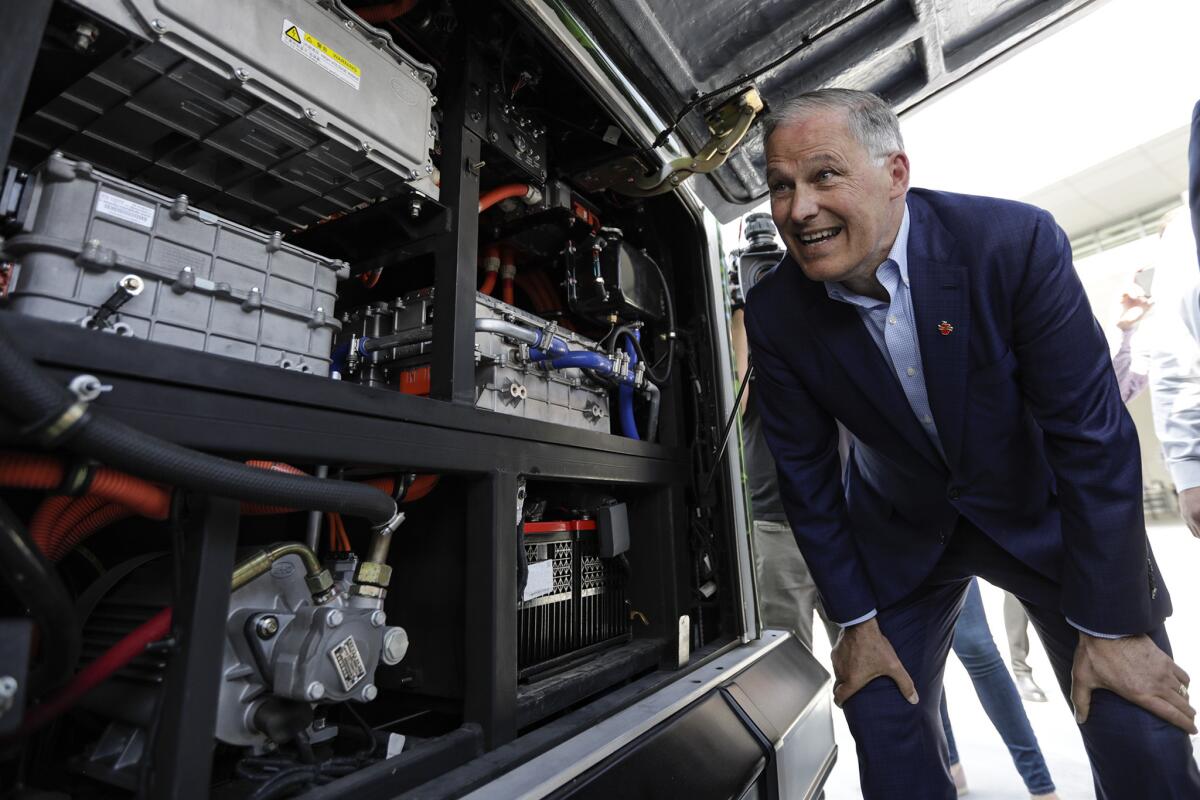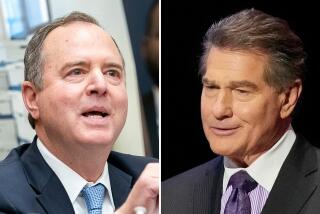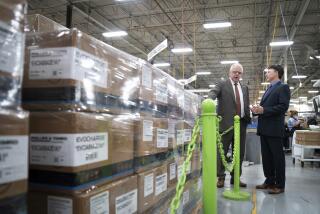2020 candidate Jay Inslee’s ambitious climate plan: 100% renewable energy by 2035

- Share via
Washington Gov. Jay Inslee unveiled an ambitious proposal to convert the United States to 100% renewable energy by 2035, a move likely to add pressure on his Democratic presidential rivals to detail their own plans to slow climate change.
His proposal would require an immediate transformation of the American economy and make the U.S. a world leader in the fight against climate change, an extraordinary move that many climate experts believe is necessary in order to limit the most devastating consequences of global warming over the next century.
The proposal he announced on Friday calls for standards requiring that all new passenger vehicles and buses be 100% emission-free by 2030, with a similarly rigorous standard set for new commercial and residential buildings, which are major contributors to carbon emissions. Electricity generation would have to be carbon-neutral by 2030 — any carbon released would have to be offset by a cut somewhere else — and then totally carbon-free by 2035.
Inslee said he would shut down coal-fired energy plants and guarantee government support for affected workers and communities. Tax incentives and federal grants would encourage the development and deployment of clean-energy technology; zero-emissions vehicles would be required to be built in the U.S., by union workers.
Inslee, in his second term as governor after serving more than a decade in Congress, is polling near the bottom of the Democratic field of more than 20 candidates. He is staking his candidacy on the belief that Democratic voters — who surveys show are increasingly concerned about the environment — will agree that climate change needs to be the central defining policy issue of the next presidency.
He has called for a presidential debate solely focused on climate change.
“I am convinced that this will rescue Americans from the titanic ravages of costs associated with climate change,” Inslee said of his proposal in an interview with the Los Angeles Times on Thursday in San Francisco. “It’s tearing up our forests, it’s burning down our towns, it’s flooding our fields, it’s drowning our streets and coastal cities.”
The plan, notably, does not call for a carbon tax. That reflects Inslee’s experience in Washington state, where he failed to enact such a measure because of opposition from business interests. Instead, the governor helped pass a state law that phases out coal use by 2025 and requires 100% clean energy generation by 2045 — which has become a model for his even more ambitious federal proposal.
“It’s built on the successes of our state,” Inslee said.
Climate experts praised the scale of Inslee’s plan. International climate officials believe the world needs to reach “net zero” on carbon emissions by 2050, meaning either carbon emissions are totally eliminated or are offset by absorbing an equivalent amount of carbon from the atmosphere.
“The 100% clean energy plan by Gov. Inslee is clearly ambitious and at the same time achievable,” said Niklas Hoehne, partner at the NewClimate Institute in Germany, which studies climate change.
American experts, while welcoming the plan’s goals, were a little more skeptical about the political plausibility of its execution, especially if Republicans retain control of the Senate. Inslee has called for the end of the filibuster, which would allow legislation to be approved with a simple majority in the Senate.
“The challenge for this (or any plan) is whether and how it might be implemented without legislation — and the degree to which its achievement will depend on moving legislation through Congress,” Michael Wara, the director of Stanford’s Climate and Energy Policy Program, wrote in an email.
David Victor, professor of international relations and climate science at UC San Diego, said Inslee’s plan lacked some details on how to meet its goals. “It is not clear to me that supply chains could meet the need for all new light- and medium-duty vehicles and buses, along with all new buildings, to be zero-emission by 2030.”
Still, Victor said of Inslee, “no other candidate is devoting this much attention to the climate issue.”
That perhaps explains some of Inslee’s recent criticism of a 2020 rival, Beto O’Rourke, who released his own large-scale plan to fight climate change. The former congressman from Texas would spend trillions of dollars to wean the country off fossil fuels with a goal to reduce net greenhouse gas emissions to zero by 2050.
“I favor and I appreciate anybody following my leadership,” Inslee said sardonically of O’Rourke at a voter forum at the Commonwealth Club in San Francisco on Thursday. “I think it’s wonderful that candidates have discovered climate change in the last several days.”
The climate experts said that Inslee’s plan was more aggressive than O’Rourke’s, but that O’Rourke’s plan was more detailed and more focused on preparing for coming disasters.
Inslee’s policy rollout Friday — which included a visit to the Los Angeles Department of Transportation electric bus depot in downtown Los Angeles alongside Mayor Eric Garcetti — drew praise from environmental groups including Greenpeace and the Sunrise Movement.
“I commend Gov. Inslee for presenting a bold climate action plan,” Democratic former Gov. Jerry Brown said in a statement to ABC News. “It is time for the other candidates to also confront global warming and the profound threat it constitutes for America, and yes, for the entire world. Time is running out.”
More to Read
Get the L.A. Times Politics newsletter
Deeply reported insights into legislation, politics and policy from Sacramento, Washington and beyond. In your inbox three times per week.
You may occasionally receive promotional content from the Los Angeles Times.











